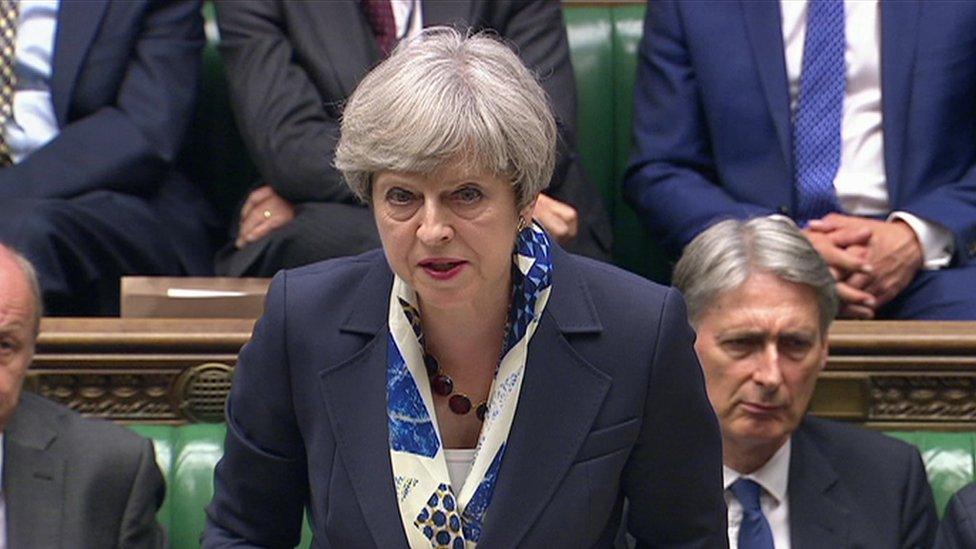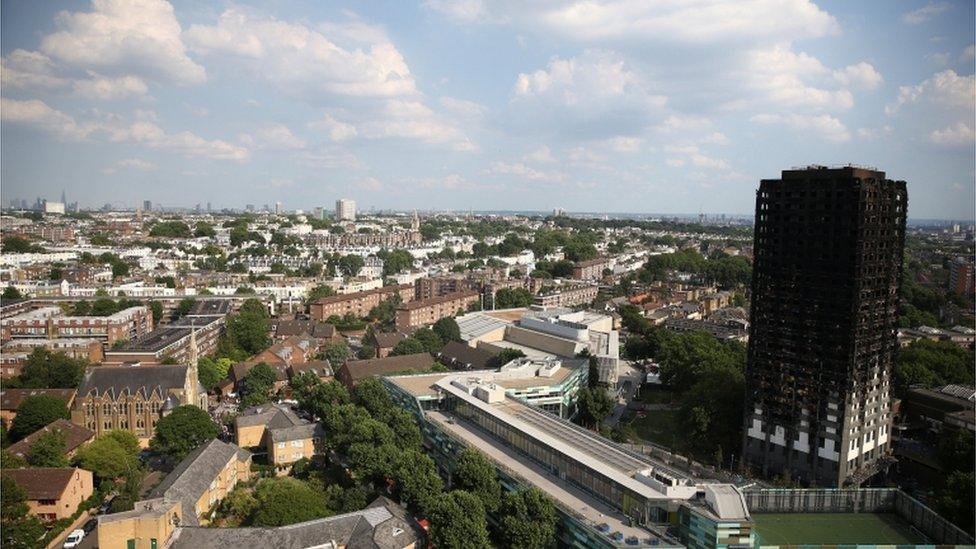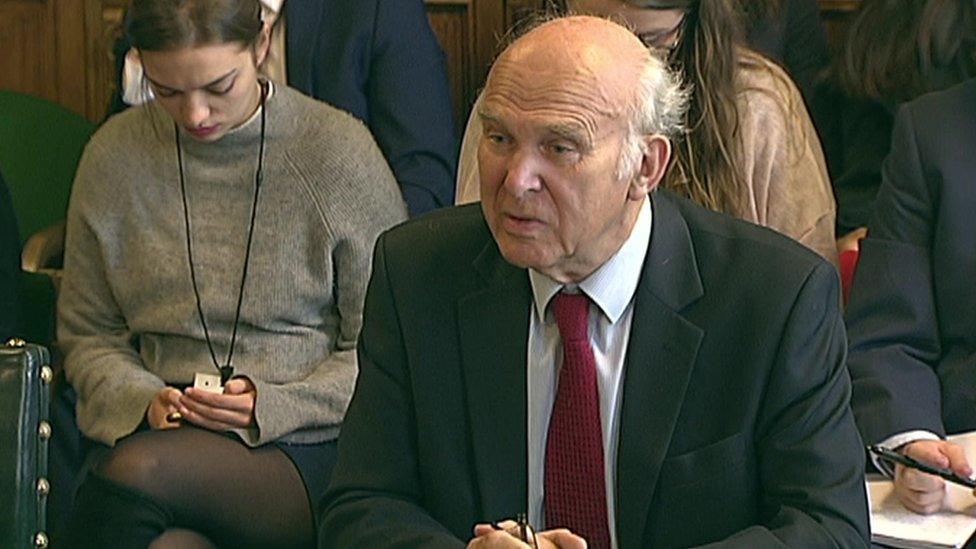Week ahead in Parliament
- Published
- comments

Will Theresa May face problems as MPs vote on the Queen's Speech on Thursday?
The new Parliament swings into action next week with votes on the Queens Speech in the Commons and Lords.
And behind the scenes the whole place is seething with intrigue and jockeying for position.
The first point to make is that almost no-one imagined the election two weeks ago would lead to the current hung Parliament, so all kinds of factions and individuals are still coming to terms with the new scenario and are still working out their objectives and strategies.
Already the government has made its opening procedural gambit of declaring a two-year parliamentary session. I doubt this move is anything to do with avoiding a vote on a Queen's Speech in 2018, as some have speculated.
To be sure it would be bad news for any government to be defeated on their legislative programme, but Labour can table a no-confidence motion at any time, so removing one possible occasion for such a vote seems an unlikely ploy.
What the two-year session does do is ensure there is plenty of time available to frustrate delaying tactics against key legislation, including Brexit legislation.
Meanwhile, the opposition parties are busy putting down amendments to the Queen's Speech, on issues ranging from UK access to the EU single market to keeping EU environmental standards.
The problem they have is that they seldom support each other's efforts, so Labour MPs, for example, are unlikely to jump aboard a Lib Dem amendment on single market access - although they might produce one of their own. It will be interesting to see if Mr Speaker repeats his 2013 decision to allow a backbench amendment to the Speech to be voted on which allowed pro-Brexit Tory backbenchers to push David Cameron to commit to an EU referendum.
There are also more elections - this time to internal Commons posts, like select committee chairs. As I detailed in earlier posts, there is no timetable in place for these, but plenty of candidates have already taken the field, vying for key jobs like the (vacant) chairs of the Treasury Committee and the Business Committee.
A deputy speakership is in play, following the defeat of Labour's Natascha Engel, and further down the line there are MPs angling for key internal posts like the Chair of the Liaison Committee, the super-committee of select committee chairs, which is best known for its sessions quizzing the prime minister, but which also has a key role in the Commons internal machinery.
Quite a number of hopefuls are already canvassing, although it might be quite a while before the actual elections take place.
Over in the Lords, peers are working out what the constitutional implications of a hung Parliament might be for them; do the normal conventions protecting bills promised in a winning party's manifesto apply, when there is a minority government? Inquiring minds want to know, and these abstruse questions, normally pondered only in political science essays, may become as real as a slap in the face, a little later in the Parliament.
Monday
The Commons convenes at 2.30 pm. There are no departmental question times scheduled until after the Queen's Speech debate, but the opportunity is there for MPs to ask urgent questions.
There will probably a statement from the prime minister on the outcome of the latest EU summit - and that will give MPs the chance to examine her promise that three million EU citizens, living in the UK, will be allowed to stay on in the UK post-Brexit, with the same rights to welfare, pensions and education as UK citizens, provided they've been resident for five years.

Questions will continue to be asked about the Grenfell Tower fire, and Labour MP Jim Fitzpatrick will lead an adjournment debate on Monday
The main debate - carrying on from the statement - will be the continuation of the debate on the Queen's Speech - where the focus will be on Brexit and foreign affairs. It will be an early test of the idea that opinion in the Commons has shifted towards a "softer Brexit".
The day ends with an adjournment debate led by Labour MP Jim Fitzpatrick on the Grenfell Tower fire.
In the Lords (2.30 pm) proceedings being with the introduction of a straggler from David Cameron's resignation honours list - Baroness Wyld, the former Downing Street aide Laura Wyld, who had served as head of the Prime Minister's Appointments Unit, which included vetting nominations to the House of Lords.
Then keep an eye out for a question from the Labour peer, Roy Kennedy on the 2018 Parliamentary Boundary Reviews, which aim to create a 600-seat House of Commons, and which many suspect may now be scrapped.
The Lords debate on the Queen's Speech focuses on business, economic affairs, energy, transport, environment and agriculture.
Tuesday
In the Commons (11.30 am), question time resumes with Business, Energy and Industrial Strategy ministers under the microscope. Then, the debate on the Queen's Speech resumes, with the focus on education and local services.
The adjournment debate, on improvements to neighbourhood planning is led by the Conservative, John Howell, one of the architects of the local planning reforms put in place by the coalition government.
In the Lords (2.30 pm) the debate on the Queen's Speech continues, with the theme for the day, home affairs, justice, constitutional affairs, devolved affairs, communities and local government - expect more discussion of the Grenfell Tower disaster.
Wednesday
In the Commons (11.30 am) the first business is Northern Ireland questions, which takes on extra interest in the finely-balanced circumstances of a hung Parliament.
At noon comes the first Prime Minister's Questions since the election - where the dynamics will be very different from those the last time Theresa May faced Jeremy Corbyn at PMQs. It will also see the debut of Ian Blackford as the SNP's new Westminster leader.

Sir Vince Cable is standing as candidate for Lib Dem leader
The Queen's Speech debate covers health, social care and security - one of the biggest and most sensitive election issues, and at the end of the debate MPs will vote on Labour's main amendment (technically, MPs are voting on a motion of thanks to the Queen for her Speech, and the amendment will probably include "respectful regrets" about various aspects of the government legislative programme it contained).
The adjournment, led by the Lib Dem leadership contender, Sir Vince Cable, is on another electorally-sensitive subject: the school funding formula in London.
In the Lords (3pm) questions to ministers are followed by another day of debate on the Queen's Speech - where the theme will be Exiting the European Union - with considerable speculation on how the Lords will approach Brexit legislation, this debate should be watched and analysed closely, particularly when the many pro-EU Conservative peers speak.
So far 59 peers are down to speak, and it will be interesting to see if the amendment proposed by the former Labour Transport Secretary, Lord Adonis, regretting that the speech "contains no proposal for Her Majesty's Government to seek to negotiate continued membership of the European Single Market and Customs Union," attracts any Conservative votes.
There are two points to note about that motion: first, the wording is likely to evolve somewhat before Wednesday, as it is honed to maximise its cross-party appeal; second the vote is likely to be at the end of proceedings, when quite a number of peers may have departed, making a government defeat less likely.
Thursday
In the Commons (9.30 am) the day begins with Culture, Media and Sport questions, followed at 10.10 am by questions to the Attorney General. (But before that, at 9am, the annual private members' bill ballot is held, setting seven lucky MPs, and maybe a few more, on course to present the legislation of their choice for debate in the autumn.)
Then MPs move on to the final day of the Queen's Speech debate - on the economy and jobs. MPs will also vote on the remaining amendments - raising the interesting question of whether the Speaker will select any backbench amendments, as he did when there were strong calls for an EU referendum, in 2013.
The final vote on the Queen's Speech will be the first real test of the government's majority. The votes on amendments from opposition parties are usually less of a test, because, for example, the SNP or Lib Dems might not wish to vote with Labour.
But the final vote does pit the government and its Commons supporters against the united forces of the Opposition.
In the Lords (11 am) watch out for the question from the Labour peer, Lord Dubs, author of the "Dubs amendment", on the number of unaccompanied child refugees entering the UK under the Immigration Act 2016 or the Dublin III regulations.
After question time, peers move on to their final Queen's Speech debate on education, health, welfare, pensions and culture.
Neither House sits on Friday 30 June.